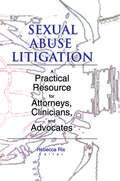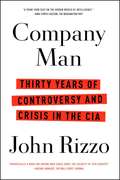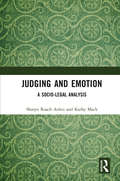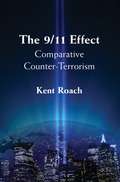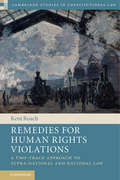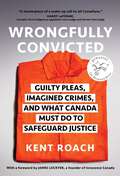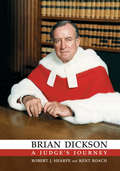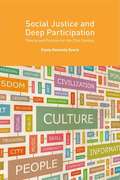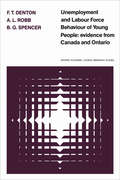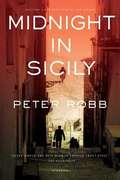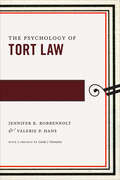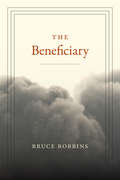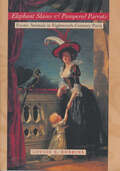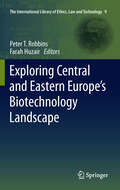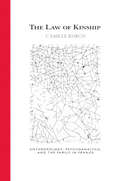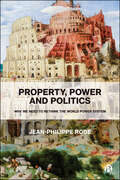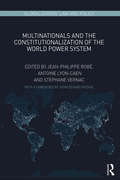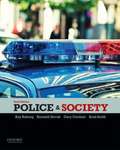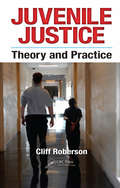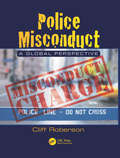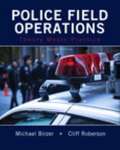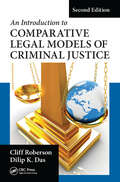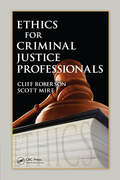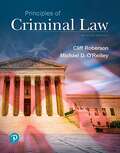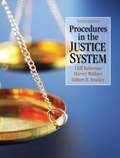- Table View
- List View
Sexual Abuse Litigation: A Practical Resource for Attorneys, Clinicians, and Advocates
by Rebecca A RixPrepare a solid case with advice from successful litigators!Ideal for use as a legal guide or a practical reference, Sexual Abuse Litigation examines how professionals can responsibly and effectively advocate on behalf of adult survivors of child sexual abuse (CSA) in the midst of the controversies surrounding recovered memories. This comprehensive book places the current recovered-memory controversy in historical context and examines how various psychological and medical conceptions of trauma have shaped public opinion and the construction of delayed discovery statutes of limitations. For lawyers, advocates, clinicians, and CSA survivors, Sexual Abuse Litigation offers practical advice in clear prose and an easy-to-use format. Summaries, charts, legal practice tips, and samples of actual testimony make this book an invaluable reference tool. It also tabulates the statutes of limitations for sexual abuse cases in all fifty states. In Sexual Abuse Litigation, experienced litigators will guide you through the phases of the legal process, offering practical suggestions on: case evaluation and development the pitfalls and opportunities of professional cooperation between therapists and lawyers the effective use of plaintiff expert witnesses strategies for countering the ”false memories” defense the identification of insurance benefits for injuries related to CSA techniques for cross-examining expert witnesses for the defense vital networking information, including resource referrals for adult survivors, help with appellate cases, and information on abuse by clergy and other professionalsOffering strategies for sustaining the admissibility of the CSA survivor's testimony and how to maintain focus on the question of whether abuse occurred, Sexual Abuse Litigation will give you or your client the necessary information on how to successfully prepare for a CSA case and face the challenges of such cases in the courtroom.
Company Man: Thirty Years of Controversy and Crisis in the CIA
by John RizzoThe “revealing” (The New Yorker) insider history of the CIA from a lawyer with a “front-row seat on the hidden world of intelligence” (The Washington Post). Former CIA director George J. Tenet called Company Man a “must read.”Over the course of a thirty-four-year (1976-2009) career, John Rizzo served under eleven CIA directors and seven presidents, ultimately becoming a controversial public figure and a symbol and victim of the toxic winds swirling in post-9/11 Washington. In Company Man, Rizzo charts the CIA’s evolution from shadowy entity to an organization exposed to new laws, rules, and a seemingly never-ending string of public controversies. As the agency’s top lawyer in the years after the 9/11 attacks, Rizzo oversaw actions that remain the subject of intense debate, including the rules governing waterboarding and other “enhanced interrogation techniques.”Rizzo writes about virtually every significant CIA activity and controversy over a tumultuous, thirty-year period. His experiences illuminate our nation’s spy bureaucracy, offering a unique primer on how to survive, and flourish, in a high-powered job amid decades of shifting political winds. He also provides the most comprehensive account of critical events, like the “torture tape” fiasco surrounding the interrogation of Al Qaeda suspect Abu Zubayadah, and the birth, growth, and death of the enhanced interrogation program. Company Man is the most authoritative insider account of the CIA ever written—a groundbreaking, timely, and remarkably candid history of American intelligence. This is “emphatically a book for anyone who cares about the security of this country” (The Wall Street Journal).
Judging and Emotion: A Socio-Legal Analysis
by Sharyn Roach Anleu Kathy MackJudges embody impartial legal authority. They are the nexus between formal abstract law, the legal institution of the court, and the practical tasks of making and communicating decisions. Because emotions are often viewed as inherently irrational, disorderly, impulsive and personal, and therefore inconsistent with the impartiality required for a legitimate exercise of judicial authority, judging is usually understood to be unemotional. This conventional model of judging emphasises reason over feeling and legal rules over emotion. But, despite these powerful expectations of judicial dispassion and detachment, emotions and emotional capacities are inevitably part of judging and courtroom practice. This book addresses the place of emotion in judicial work. Grounded in empirical data – interviews, observations and surveys – it investigates how judicial officers understand, experience, deploy, display and manage emotions as part of their everyday work, especially in court. Building on a growing interest in emotions – in law and elsewhere – the book offers a much-needed empirical examination of the relationship between judging and emotion, as it considers how tensions between the demand for emotional engagement and the obligation of constraint are managed at the level of the individual judicial officer, and institutionally.
The 9/11 Effect: Comparative Counter-terrorism
by Kent RoachThis book critically and comparatively examines the responses of the United Nations and a range of countries to the terror attacks on September 11, 2001. It assesses the convergence between the responses of Western democracies including the United States, the United Kingdom, Australia and Canada with countries with more experience with terrorism including Egypt, Syria, Israel, Singapore and Indonesia. A number of common themes - the use of criminal law and immigration law, the regulation of speech associated with terrorism, the review of the state's whole of government counter-terrorism activities, and the development of national security policies - are discussed. The book provides a critical take on how the United Nations promoted terrorism financing laws and listing processes and the regulation of speech associated with terrorism but failed to agree on a definition of terrorism or the importance of respecting human rights while combating terrorism.
Remedies for Human Rights Violations: A Two-Track Approach to Supra-national and National Law (Cambridge Studies in Constitutional Law #27)
by Kent RoachAn innovative book that provides fresh insights into the neglected field of remedies in both international and domestic human rights law. Providing an overarching two-track theory, it combines remedies to compensate and prevent irreparable harm to litigants with a more dialogic approach to systemic remedies. It breaks new ground by demonstrating how proportionality principles can improve remedial decision-making and avoid reliance on either strong discretion or inflexible rules. It draws on the latest jurisprudence from the European and Inter-American Courts of Human Rights and domestic courts in Australia, Canada, India, New Zealand, Hong Kong, South Africa, the United Kingdom and the United States. Separate chapters are devoted to interim remedies, remedies for laws that violate human rights, damages, remedies in the criminal process, declarations and injunctions in institutional cases, remedies for violations of social and economic rights and remedies for violations of Indigenous rights.
Wrongfully Convicted: Guilty Pleas, Imagined Crimes, and What Canada Must Do to Safeguard Justice
by Kent RoachA top legal scholar explains Canada&’s national tragedy of wrongful convictions, how anyone could be caught up in them, and what we can do to safeguard justice.Canada&’s legal system has a serious problem: a significant but unknown number of people have been convicted for crimes they didn&’t commit. There are famous cases of wrongful convictions, such as David Milgaard and Donald Marshall Jr., where the system convicted the wrong person for murder. But there are lesser-known cases: people who feel they have no option but to plead guilty, and people convicted of crimes that were imagined by experts or the police that never, in fact, happened. Kent Roach, cofounder of the Canadian Registry of Wrongful Convictions, award-winning author, and law professor, has dedicated his illustrious career to documenting flaws in our justice system. His work reveals that the burden of wrongful convictions falls disproportionately on the disadvantaged, including Indigenous and racialized people, those with cognitive issues, single mothers, and the poor. Wrongfully Convicted raises awareness about wrongful convictions at a time when DNA exonerations are less frequent and the memories of most famous wrongful convictions are fading. Roach makes a compelling case for change that governments have so far lacked the courage to make. They include better legislative regulation of police and forensic experts and the creation of a permanent and independent federal commission both to investigate wrongful convictions and their multiple causes. Roach&’s research and vast knowledge point to systemic failings in our legal system. But he also outlines vital changes that can better prevent and correct wrongful convictions. Until we do, many of the wrongfully convicted are still waiting for the promise of justice. It is an issue that affects all Canadians.
Brian Dickson
by Kent Roach Robert J. SharpeWhen Brian Dickson was appointed in 1973, the Supreme Court of Canada was preoccupied with run-of-the-mill disputes. By the time he retired as Chief Justice of Canada in 1990, the Court had become a major national institution, very much in the public eye. The Court's decisions, reforming large areas of private and public law under the Charter of Rights, were the subject of intense public interest and concern.Brian Dickson played a leading role in this transformation. Engaging and incisive, Brian Dickson: A Judge's Journey traces Dickson's life from a Depression-era boyhood in Saskatchewan, to the battlefields of Normandy, the boardrooms of corporate Canada and high judicial office, and provides an inside look at the work of the Supreme Court during its most crucial period. Dickson's journey was an important part of the evolution of the Canadian judiciary and of Canada itself. Sharpe and Roach have written an accessible biography of one of Canada's greatest legal figures that provides new insights into the work of Canada's highest court.
Social Justice And Deep Participation
by Paula Donnelly RoarkKnowing what deep participation is, and how it works, can make a critical difference in solving 21st century economic, political, and social problems. This book provides a new approach to hands-on change and begins formulation of a participatory social theory promising greater prosperity and justice for all.
Unemployment and Labour Force Behaviour of Young People: Evidence from Canada and Ontario
by A. Leslie Robb Byron Spencer Frank DentonWhile the unemployment rate for young people has always tended to be well above the average, this tendency has been greatly accentuated in recent years. There is a large turnover in the youth labour force, and the employment of experience of those between the ages of eighteen and twenty-five has been marked by seasonal variations. This study discusses the factors which contribute to the high youth unemployment rate, examines the historical record of labout force participation, and provides some projections into the future.
Midnight in Sicily
by Peter RobbSouth of mainland Italy lies the island of Sicily, home to an ancient culture that--with its stark landscapes, glorious coastlines, and extraordinary treasure troves of art and archeology--has seduced travelers for centuries. But at the heart of the island's rare beauty is a network of violence and corruption that reaches into every corner of Sicilian life: Cosa Nostra, the Mafia. Peter Robb lived in southern Italy for over fourteen years and recounts its sensuous pleasures, its literature, politics, art, and crimes.
The Psychology of Tort Law (Psychology and the Law #2)
by Jennifer K Robbennolt Valerie P HansTort law regulates most human activities: from driving a car to using consumer products to providing or receiving medical care. Injuries caused by dog bites, slips and falls, fender benders, bridge collapses, adverse reactions to a medication, bar fights, oil spills, and more all implicate the law of torts. The rules and procedures by which tort cases are resolved engage deeply-held intuitions about justice, causation, intentionality, and the obligations that we owe to one another. Tort rules and procedures also generate significant controversy—most visibly in political debates over tort reform.The Psychology of Tort Law explores tort law through the lens of psychological science. Drawing on a wealth of psychological research and their own experiences teaching and researching tort law, Jennifer K. Robbennolt and Valerie P. Hans examine the psychological assumptions that underlie doctrinal rules. They explore how tort law influences the behavior and decision-making of potential plaintiffs and defendants, examining how doctors and patients, drivers, manufacturers and purchasers of products, property owners, and others make decisions against the backdrop of tort law. They show how the judges and jurors who decide tort claims are influenced by psychological phenomena in deciding cases. And they reveal how plaintiffs, defendants, and their attorneys resolve tort disputes in the shadow of tort law. Robbennolt and Hans here shed fascinating light on the tort system, and on the psychological dynamics which undergird its functioning.
The Beneficiary
by Bruce RobbinsFrom iPhones and clothing to jewelry and food, the products those of us in the developed world consume and enjoy exist only through the labor and suffering of countless others. In his new book Bruce Robbins examines the implications of this dynamic for humanitarianism and social justice. He locates the figure of the "beneficiary" in the history of humanitarian thought, which asks the prosperous to help the poor without requiring them to recognize their causal role in the creation of the abhorrent conditions they seek to remedy. Tracing how the beneficiary has manifested itself in the work of George Orwell, Virginia Woolf, Jamaica Kincaid, Naomi Klein, and others, Robbins uncovers a hidden tradition of economic cosmopolitanism. There are no easy answers to the question of how to confront systematic inequality on a global scale. But the first step, Robbins suggests, is to acknowledge that we are, in fact, beneficiaries.
Elephant Slaves & Pampered Parrots: Exotic Animals in Eighteenth-Century Paris (Animals, History, Culture)
by Louise E. RobbinsThis lively history “adds a new dimension to our understanding of 18th-century France” by exploring the Parisian fashion of importing exotic animals (American Historical Review).In 1775, a visitor to Laurent Spinacuta’s Grande Ménagerie at the annual winter fair in Paris would have seen two tigers, several kinds of monkeys, an armadillo, an ocelot, and a condor—in all, forty-two live animals. In the streets of the city, one could observe performing elephants and a fighting polar bear. Those looking for unusual pets could purchase parrots, flying squirrels, and capuchin monkeys. The royal menagerie at Versailles displayed lions, cranes, an elephant, a rhinoceros, and a zebra, which in 1760 became a major court attraction.For Enlightenment-era Parisians, exotic animals piqued scientific curiosity and conveyed social status. Their variety and accessibility were a boon for naturalists like Buffon, author of Histoire naturelle. Louis XVI use his menagerie to demonstrate his power, while critics saw his caged animals as metaphors of slavery and oppression. In her engaging account, Robbins considers nearly every aspect of France’s obsession with exotic fauna, from the animals’ transportation and care to the inner workings of the oiseleurs’ (birdsellers’) guild. Based on wide-ranging research, Elephant Slaves and Pampered Parrots offers a major contribution to the history of human-animal relations, eighteenth-century culture, and French colonialism.
Exploring Central and Eastern Europe’s Biotechnology Landscape
by Peter T. Robbins Farah HuzairAt a time when the human genome has been sequenced advances in the life sciences seem to have great potential for human health, industry and the environment throughout Central and Eastern Europe (CEE). Still, for some, potential risks and ethical dilemmas remain, surrounding issues such as the appropriate use of GM crops, stem cells, genetic information, the nature of intellectual property and other challenges that come with EU accession. This book is the first of its kind to bring together experts from across Europe to explore the landscape of current life science policy and industrial development in CEE, including implications for economies, regulatory and legal frameworks, health care, ethics and human rights. It will be essential reading for researchers and students in science and technology studies, development, sociology, politics and law, and those interested in life science development in transition economies.
The Law Of Kinship
by Camille RobcisIn France as elsewhere in recent years, legislative debates over single-parent households, same-sex unions, new reproductive technologies, transsexuality, and other challenges to long-held assumptions about the structure of family and kinship relations have been deeply divisive. What strikes many as uniquely French, however, is the extent to which many of these discussions-whether in legislative chambers, courtrooms, or the mass media-have been conducted in the frequently abstract vocabularies of anthropology and psychoanalysis. In this highly original book, Camille Robcis seeks to explain why and how academic discourses on kinship have intersected and overlapped with political debates on the family-and on the nature of French republicanism itself. She focuses on the theories of Claude Levi-Strauss and Jacques Lacan, both of whom highlighted the interdependence of the sexual and the social by positing a direct correlation between kinship and socialization. Robcis traces how their ideas gained recognition not only from French social scientists but also from legislators and politicians who relied on some of the most obscure and difficult concepts of structuralism to enact a series of laws concerning the family. Levi-Strauss and Lacan constructed the heterosexual family as a universal trope for social and psychic integration, and this understanding of the family at the root of intersubjectivity coincided with the role that the family has played in modern French law and public policy. The Law of Kinship contributes to larger conversations about the particularities of French political culture, the nature of sexual difference, and the problem of reading and interpretation in intellectual history.
Property, Power and Politics: Why We Need to Rethink the World Power System
by Jean-Philippe RobéGlobalization is an extraordinary phenomenon affecting virtually everything in our lives. And it is imperative that we understand the operation of economic power in a globalized world if we are to address the most challenging issues our world is facing today, from climate change to world hunger and poverty. This revolutionary work rethinks globalization as a power system feeding from, and in competition with, the state system. Cutting across disciplines of law, politics and economics, it explores how multinational enterprises morphed into world political organisations with global reach and power, but without the corresponding responsibilities. In illuminating how the concentration of property rights within corporations has led to the rejection of democracy as an ineffective system of government and to the rise in inequality, Robé offers a clear pathway to a fairer and more sustainable power system.
Multinationals and the Constitutionalization of the World Power System (Globalization: Law and Policy)
by Jean-Philippe Robe Antoine Lyon-Caen Stéphane VernacThis collection offers a powerful and coherent study of the transformation of the multinational enterprise as both an object and subject of law within and beyond States. The study develops an analysis of the large firm as being a system of organization exercising vast powers through various instruments of private law, such as property rights, contracts and corporations. <P><P>The volume focuses on the firm as the operational unit of governance within emerging systems of globalization, whilst exploring in-depth the forms within which the firm might be regulated as against the inhibiting parameters of national law. It connects, through the ordering concept of the firm in globalization, the distinct regimes of constitutionalization, national and international law. <P><P>The study will be of interest to students and academics in globalization and the regulation of multinational corporations, as well as law, economics and politics on a global scale. It will also interest government leaders and NGOs working in the areas of MNE regulations.
Police & Society, Sixth Edition
by Roy Roberg Kenneth Novak Gary Cordner Brad SmithPolice & Society offers an in-depth and analytical look at the process of policing, from police behavior and organization to operations and historical perspectives. Focusing on the relationship between the police and the community and how it has changed throughout the years, the authors explore the most important theoretical foundations and incisive research on contemporary policing and show how that research is put into practice.
Juvenile Justice: Theory and Practice
by Cliff RobersonOver several hundred years, the juvenile justice system has evolved from one in which a child offender was prosecuted under the same guidelines used for adults to the current system in which society has recognized the unique status of juveniles within the criminal justice framework. Written by world-renowned legal scholar Cliff Roberson, Juvenile J
Police Misconduct: A Global Perspective
by Cliff RobersonThis book explores the different types of police misconduct including the use of excessive force. It also explores what types of officers become involved in illegal misconduct, steps jurisdictions may take to prevent such problems, and discusses who should police the police. Also included is a historical analysis of police misconduct, discussions on the legal restrictions designed to prevent police misconduct, and steps that the jurisdiction may take to limit their liability. Ancillary material is available with course adoption.
Police Field Operations: Theory Meets Practice
by Cliff Roberson Michael L. BirzerPolice Field Operations: Theory Meets Practice, 2/e is a comprehensive, readable text that presents a practical look at police field operations and is designed to be used in one-semester courses on police operations or patrol procedures. Chapters have been designed to be independent units that can be taught individually, but also build upon each other to provide a complete picture of police operations. The text cover all major areas of police operations including patrolling, investigations, crime mapping, community policing, hot pursuit issues, communications, gangs and drugs, and more. Discussions focus on issues and challenges that police officers face on the job and help students bridge the gap between theory and practice.
An Introduction to Comparative Legal Models of Criminal Justice
by Cliff Roberson Dilip K. DasUpdated to reflect changes in the criminal justice systems in several countries, An Introduction to Comparative Legal Models of Criminal Justice, Second Edition explores and illustrates the idea that a country‘s legal model determines the character of its police, corrections, and legal system. It focuses on how law shapes policing, including how it
Ethics for Criminal Justice Professionals
by Cliff Roberson Scott MireIncreasing concerns about the accountability of criminal justice professionals at all levels has placed a heightened focus on the behavior of those who work in the system. Judges, attorneys, police, and prison employees are all under increased scrutiny from the public and the media. Ethics for Criminal Justice Professionals examines the myriad of e
Principles of Criminal Law
by Cliff Roberson Michael D. O’ReilleyFor courses in criminal law. A succinct, readable survey of criminal law Principles of Criminal Law is a clear, efficient introduction to criminal law viewed through the lens of human behavior. Concise enough for a one-semester course, it provides critical background information, establishes elements of major crimes, and covers a vast range of crimes, including white¿-collar, victimless, and political crimes -- without dense citations or lengthy discussion. Bolstered by cases and critical-thinking features, the 7th edition has new information on organized and white-collar crime, up-to-date marijuana laws, and additional content on specific crimes and legal rules.
Procedures in the Justice System (10th Edition)
by Cliff Roberson Harvey WallaceProcedures in the Justice System, 10e, is comprehensive yet readable. Designed for one-semester courses on American criminal courts, it covers the court systems and processes using a sequential approach-following law violators from arrest to conviction and sentencing. Each chapter examines the roles that law enforcement agencies, courts, and correctional departments play in the process, and builds logically on previous material. Down-to-earth examples, illustrations, court documents, and cases help make procedures more real and concrete.
